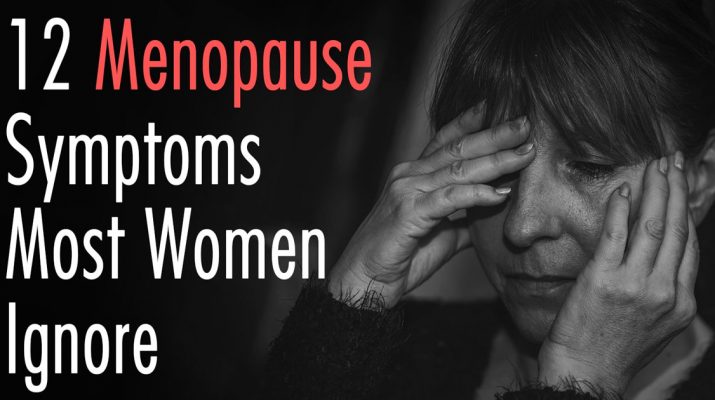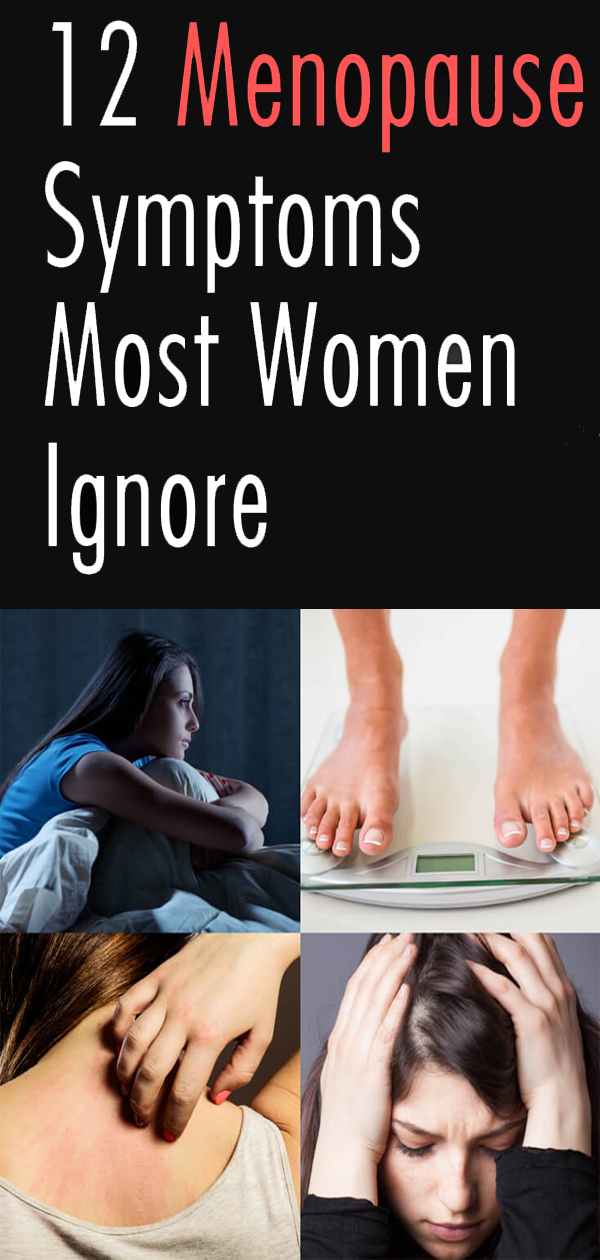Many menopause symptoms go unnoticed by women because they attribute them to something else. People generally associate hot flashes with menopause-related health problems. While hot flashes are certainly one of the most recognized menopause symptoms, there are other symptoms that may be less obvious.
This is partly due to the fact that they can all be caused by any number of reasons or conditions, and in some cases, the cause could be idiopathic. However, when you put the symptoms together and factor in age, it may become obvious that these related symptoms are due to menopause-related problems.
Women go through a pre-menopause stage called perimenopause. There is also an after-stage called postmenopause. Symptoms can happen in any stage of the condition. Below are twelve not-so-obvious menopause symptoms that can happen in any stage.
1. Night Sweats
Night sweats are basically hot flashes that occur in your sleep. Chances are if you experience hot flashes during the day, you’ll experience night sweats at some point. This could be accompanied by secondary general hyperhidrosis, which is excessive sweating.
If you have night sweats as a menopause-related symptom, there really is no pattern to them. They range in severity from mild, to moderate, to extreme and they may or may not wake you up. They last anywhere from one to five minutes with the average being three minutes. You may experience many of them in an hour, one a day, one a week, or anything in between.
2. Sleep Problems
Many women experience sleep problems. This could be due to night sweats or hormone fluctuations (also a symptom we discuss further in this article). Women may begin to snore and in extreme cases, some women may even suffer from insomnia.
Sometimes women who have menopause-related sleep disorders can develop sleep apnea. This condition is characterized by small periods of time that you stop breathing while sleeping. In other cases, women may not lose any sleep time, but the quality of their sleep will suffer so they’ll still wake up tired.
3. Hormonal Imbalances
Menopause is basically one big hormonal imbalance. It occurs because the ovaries progressively make less and less estrogen and progesterone. This causes menstrual periods to be irregular and eventually stop altogether.
Hormonal imbalance isn’t exactly a symptom. It’s more like the cause of menopause-related problems. Because of this, it’s also the cause of menopause symptoms. Although there are hormone replacement therapies, the fact is that developing a hormonal imbalance is a part of aging. There is no cure; it’s just what happens.
4. Uterine Bleeding
Bleeding during or after menopause is not normal. It’s true that you can have heavy periods when experiencing perimenopause, but any uterine bleeding outside of this should be taken seriously. Perimenopause can cause conditions such as:
- Polyps – non-cancerous growths that can form on the uterus lining or on the cervix
- Endometrial Atrophy
- Endometrial Hyperplasia
All of these can cause uterine bleeding so it’s important to see your doctor so you can determine if you have any of these conditions.
5. Mood Swings
Because women can suffer from hormonal imbalances, they may also suffer from mood swings. Hormones basically control your mood, so if they are out of whack you may find yourself reacting to situations inappropriately[3]. Even worse, you may not be able to control your emotions very well for a while.
You may overreact to the simplest things or you may be depressed. If you’ve had problems with depression in the past, it could get worse. Other stressors in your life such as bills, empty-nest syndrome, etc. can compound the problems with mood swings.
6. Vaginal Dryness
Normally, with the right amount of estrogen, the vagina stays moist with a thin lining of fluid. This means that with a drop in estrogen, the lining may dry up, causing painful or uncomfortable sex. Not only will this feel terrible when you have sex, but it can possibly damage your vagina.
There is about a 33% chance that a woman will develop vaginal dryness. There are many treatments available to combat the dryness that range from simple topical creams to surgery.
7. Irregular Periods
Estrogen is responsible for regulating menstrual cycles so with a decrease in estrogen, your menstrual cycle can behave strangely. You may have longer periods, shorter periods, or light to heavy flows. You may even skip periods. Eventually, the end result will be no more periods at all, but during the perimenopause stage, you’ll most likely have very unpredictable menstrual cycles.
8. Memory Problems
The memory problems that women experience as a symptom aren’t as severe as dementia or amnesia, but they can be a bit annoying. Women may find themselves at a loss for certain words or unable to locate simple items like keys or a cell phone.
These memory problems can stem from a few different areas. For one, hormone imbalances can affect memory. It could also be stress-related. Women may stress about other things in their lives which can affect their memory.
9. Decreased Libido
Women who are starting perimenopause and/or going through the last two stages may find that their sex drive has decreased. This makes sense because a lot of the desire for sex comes from the natural instinct to reproduce [5] but with decreased ovulations or anovulation, reproduction ceases.
The decreased desire for sex isn’t a “medical” concern, but more of a feeling that is a result of other problems. For example, vaginal dryness can cause women to not want to have sex. The stress of going through menopause could be another reason.
10. Weight Gain
Weight gain and/or fat gain is one of the more common menopause symptoms. If you are middle-aged and you seem to be putting on weight for no reason, it could be an indication of perimenopause. The average woman gains around five pounds during this time in their life [6] and it can be more if the woman is already overweight. The weight gain can appear to be targeted because women may notice more fat around their midsections and thighs.
Although research has proven the correlation between women in one of the menopause-phases and weight gain, the reason this happens isn’t understood yet. Many researchers speculate that its simply because of age-related lifestyles. Kids are now older and women aren’t as active around this age so the lack of activity can lead to weight gain. It is more than likely a combination of aging and menopause symptoms that lead to weight gain.
11. Stiff Joints
Stiff joints and joint pain can be one of the menopause symptoms. This is due to the fact that a loss in estrogen can also mean a loss in bone mass. In fact, women can lose as much as 20 percent of their bone mass within five years of postmenopause[7]. This thinning of the bones can lead to osteoporosis.
Osteoarthritis is another condition that can lead to stiff joints and joint pain. Like osteoporosis, osteoarthritis is characterized by a loss of bone mass, but also a loss of cartilage that cushions joints. Osteoarthritis can cause older women to become disabled due to the amount of joint pain that the condition can cause.
12. Hair And Skin Become Drier
Declines in estrogen can have a major affect on your hair. Your hair may become weaker and break more easily than normal. The hormone imbalance can cause more hair to grow on your face and less on your head where you want it to be.
Your skin may suffer also. It can become dry and flaky, and wrinkles can begin to set in. Age spots will begin to show and skin cancers may begin to develop. In fact, it is at this time in a woman’s life that the risk of skin cancer goes up dramatically so it’s important to keep an eye on any concerns.
Final Thoughts
Many of the symptoms we’ve described often get attributed to something else. Some women may ignore them altogether if the symptoms aren’t severe enough. Individually, many of the symptoms can seem like isolated problems but if you notice that you have several of these symptoms and you’re in the age range of 48 to 55, there is a high probability that you are experiencing menopause symptoms.
It can be overwhelming dealing with all of them, but don’t ignore them. There are treatments available to ease many of the symptoms. Hormone therapies, medications, or even holistic therapies may provide relief. Before you know it, you can be back to your old self again.


